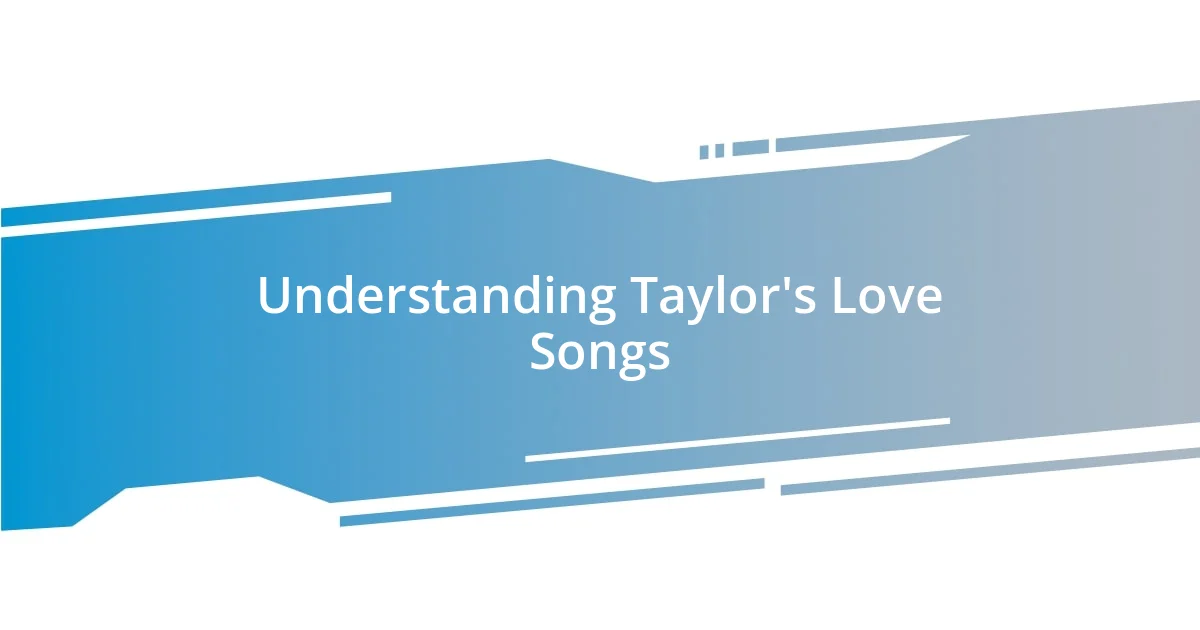Key takeaways:
- Taylor Swift’s love songs effectively convey complex emotions, capturing themes of nostalgia, regret, empowerment, and growth that resonate universally.
- The melodic structures of her songs enhance emotional impact, with variations in rhythm and tempo complementing the lyrical narratives.
- Listening to her music promotes personal reflection and connection, illustrating the power of vulnerability and the transformative nature of love in relationships.

Understanding Taylor’s Love Songs
Taylor Swift’s love songs weave a tapestry of emotions that resonate on a deeply personal level. One track that stands out to me is “All Too Well.” When I first listened to it, I vividly recalled my own heartbreaks, feeling as if Taylor had plucked those very memories from my mind. How does she manage to capture such raw emotion so effortlessly?
In diving deeper into her lyrics, you realize that each song often tells a story—like flipping through a diary of experiences and emotions. For instance, in “Love Story,” I can’t help but reflect on those naïve, yet passionate feelings of young love. Don’t you remember the thrill of secret glances or stolen moments? Taylor encapsulates that magic perfectly while blending it with a sense of hope.
What strikes me is how Taylor’s songs mirror life’s complexities; love isn’t just a fairytale, it’s messy and multifaceted. In “Back to December,” I find myself considering the theme of regret and longing. Have you ever looked back and wished you could have done something differently? Taylor’s lyrics guide us through those feelings, connecting us all on that universal journey of understanding love in its many forms.

Key Themes in Taylor’s Lyrics
When delving into Taylor’s lyrics, several key themes consistently emerge. I often find myself drawn to her exploration of love’s different phases, such as infatuation, heartbreak, and reconciliation. The raw honesty in these songs can transport me back to my own romantic experiences, making me reflect on feelings I thought I had long left behind.
Here are some key themes that surface in Taylor’s love songs:
- Nostalgia and Memory: Songs like “All Too Well” evoke vivid recollections of past relationships, capturing moments that linger in our minds.
- Regret and Longing: Tracks such as “Back to December” speak to the ache of wishing for a chance to make things right.
- Empowerment: In songs like “Shake It Off,” I appreciate how she encourages resilience and self-love after heartbreak.
- Youth and Innocence: “Love Story” perfectly encapsulates the sweetness and simplicity of young love, reflecting a more idealistic view of romance.
- Growth and Healing: Many of her songs illustrate the journey from heartbreak to growth, resonating with anyone who’s faced love’s trials.
Taylor’s ability to weave such rich narratives around these themes allows listeners to connect deeply with her experiences, making her songs both relatable and transformative.

Analyzing Melodic Structures
When I analyze the melodic structures of Taylor’s love songs, I’m often struck by how the melodies enhance the emotional undercurrents in her lyrics. For instance, in “All Too Well,” the sweeping melodies mirror the bittersweet nostalgia in the words. I remember first hearing that song and being moved not just by what she sang, but by how the rising and falling notes echoed my own memories of lost love. It’s as if each phrase played like a heartbeat, drawing me in even deeper.
Taylor’s ability to shift melody with the emotions of a song is something I admire greatly. Take “Back to December,” for example; the gentle, lullaby-like quality to the melody encapsulates feelings of regret and yearning. Listening to it feels like I’m wrapped in a blanket of warmth even while embracing those painful feelings. Have you ever felt a melody so perfectly complement your emotions? It’s moments like these that make her music resonate so widely, as if Taylor is composing the soundtrack of our lives.
Furthermore, the variations in rhythm and tempo create dynamic contrasts that reflect her narrative style. In “Love Story,” the upbeat, romantic melody juxtaposes the tension in the lyrics, creating an uplifting experience that leaves a lasting impression. There’s something about the way she plays with tempo that keeps me engaged, almost as if she understands that love comes with its ebbs and flows. I can’t help but think about how these melodic choices elevate the storytelling in a way that’s both relatable and profound.
| Song Title | Melodic Structure Analysis |
|---|---|
| All Too Well | Melody mirrors nostalgia; sweeping phrases enhance emotional impact. |
| Back to December | Gentle melody evokes feelings of regret; a warm lullaby-like quality. |
| Love Story | Uplifting tempo contrasts with lyrical tension; engages listeners fully. |

Emotional Impact of the Music
The emotional impact of Taylor’s love songs is undeniable and often feels personal to me. I remember the first time I heard “All Too Well”; the lyrics wrapped around me like a familiar embrace, igniting memories I thought were long buried. Isn’t it fascinating how a song can conjure up so much feeling? Each listen allows me to relive those moments, revealing new layers of emotion with every play.
Her music doesn’t just evoke emotions; it resonates on a profound level. For instance, “Back to December” strikes such a powerful chord within me. I can almost feel the weight of regret she conveys, bringing to mind my own moments of wishing to turn back time. There’s an intimate vulnerability in her voice that creates an unspoken connection—like we’re sharing our deepest secrets over a cup of coffee.
Even in the upbeat vibes of “Shake It Off,” I experience a rush of empowerment that’s infectious. I often find myself dancing around my living room, reminding myself that resilience in the face of heartache is not only possible but necessary. Can you recall a moment when a song made you feel invincible, as if nothing could hold you back? That’s the magic of Taylor’s music—she beautifully captures the spectrum of emotions connected to love, making her songs anthems for our shared experiences.

Personal Reflection on Connection
Reflecting on the connection I feel through Taylor’s love songs often brings me back to moments of sheer vulnerability. I remember sharing “Wildest Dreams” with a close friend during a rough patch, and how we found solace in its haunting beauty. Have you ever shared a song that seemed to capture both your pain and your hopes? It struck me then that music has a unique way of weaving our experiences together, creating an invisible thread of understanding between hearts.
There’s a certain depth to her lyrics that resonates with intimate reflections on love and loss. Listening to “The Story of Us” transports me back to a time when miscommunication clouded a relationship, and the line “This is looking like a contest of who can act like they care less” haunted my thoughts. I couldn’t help but wonder: how many have felt that nagging sense of distance in their own lives? It’s as if Taylor captures specific moments and emotions that surface in all of us, allowing for a collective healing experience within her melodies.
Sometimes, I find myself humming the chorus of “Call It What You Want” as I navigate through my own ups and downs. There’s a reassurance in the way she expresses loyalty and resilience—qualities I strive to embody. Don’t you find strength in music that mirrors your journey? It’s these connections, both personal and universal, that make Taylor’s songs not just entertainment, but essential companions in our lives.

Lessons Learned from Taylor’s Songs
Listening to Taylor’s songs has taught me the importance of acknowledging one’s emotions. For instance, I remember driving down a quiet road, the sun setting, while “Delicate” played. The raw honesty in her lyrics made me reflect on my own fears of vulnerability in relationships. Have you ever had a moment where a song just seemed to articulate everything you were feeling? In those fleeting seconds, I felt understood—like Taylor was giving me permission to feel what I often tried to suppress.
In exploring themes of heartbreak and healing, I’ve learned that growth often comes from pain. “The Archer” resonates deeply with me during moments when self-doubt creeps in. I recall listening to it during a challenging time, feeling the weight of indecision, but also recognizing that it’s okay to question myself. This genuine self-reflection can be cathartic, don’t you think? Taylor’s vulnerability reminds us that it’s alright to embrace our imperfections, paving the way for personal growth.
Moreover, the evolution in her storytelling reveals that love can be multifaceted. When I vibe to “Lover,” I appreciate how it paints a picture of contentment and partnership. It pulls me out of the darker themes and encourages me to envision healthy relationships. Have you experienced that shift from heartache to hope after a tough period? It’s a beautiful reminder that, just like life, love can transform, and it’s worth believing in that potential.

Applying Analysis to Other Artists
Analyzing Taylor’s love songs has opened my eyes to the emotional landscapes of other artists as well. For instance, when I listened to Adele’s “Someone Like You,” I felt a wave of sadness that mirrored my own experiences of longing. It’s incredible how both artists capture the ache of heartache—what is it about music that can articulate feelings we often struggle to put into words? This leads me to believe that vulnerability is a common thread in songwriting, transcending genres and leading to powerful connections with listeners.
I’ve also found that artists like Hozier bring a different flavor to love’s complexities. After diving into “Take Me to Church,” I was struck by how he challenges societal norms while exploring passionate love. My first time hearing it, I felt a mix of anger and admiration; it resonated with my own thoughts on love’s battles. Have you ever discovered an artist whose work pushes you to rethink what you know about relationships? With Hozier, it’s about embracing love in all its rawness, which is both refreshing and thought-provoking.
In examining the lyrics of artists like Ed Sheeran, I often notice a conversational style that breaks down emotional barriers. For example, “Castle on the Hill” transported me back to my childhood, igniting nostalgia intertwined with the complexities of growing up. It made me ponder: how many songs remind you of where you came from? Sheeran’s ability to blend personal memories with universal themes serves as a reminder that music can serve as both a mirror and a window into our lives—allowing us to see ourselves while exploring the depths of others’ experiences.














